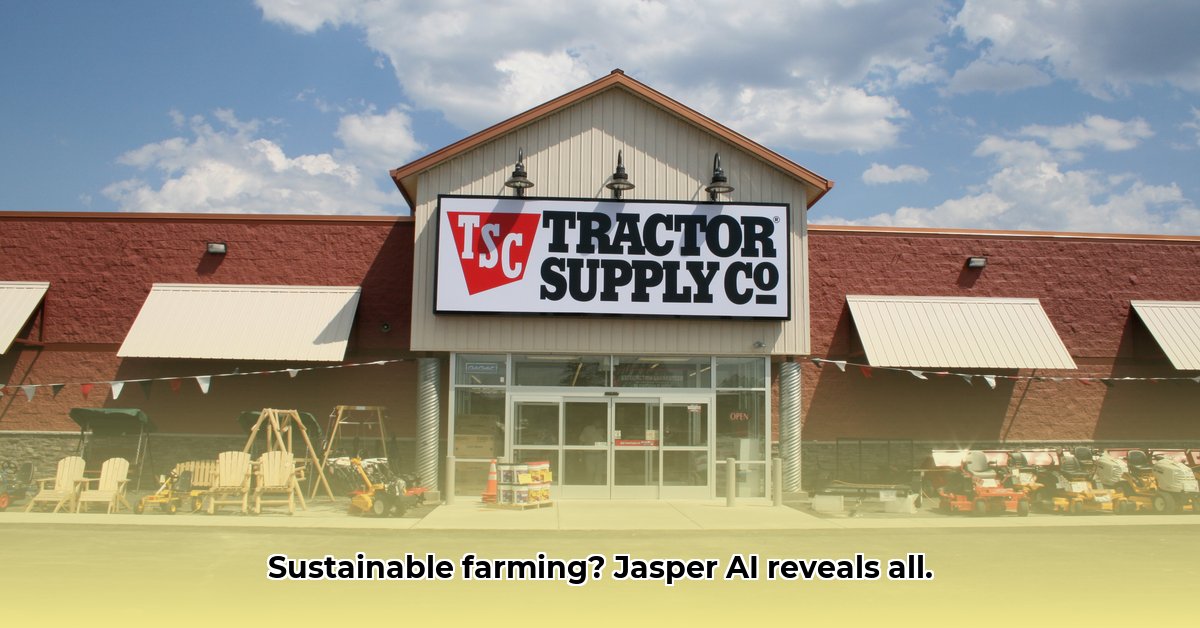
Jasper AL Tractor Supply: Assessing its Role in Sustainable Agriculture
This report analyzes Tractor Supply Company's (TSC) Jasper, Alabama, location and its contribution to promoting sustainable agricultural practices within the local community. While TSC provides readily accessible farm supplies, its direct impact on sustainable agriculture remains largely indirect and requires further investigation. The absence of publicly available data detailing the store's specific initiatives and sales figures of sustainable products hinders a comprehensive evaluation. For more information on TSC's grass seed options, check out this resource. This analysis highlights the need for greater transparency and data collection to accurately assess TSC's influence in this crucial sector.
Data Gaps and Opportunities for Improvement
Currently, a lack of transparent data limits understanding of TSC Jasper's contribution to sustainable agriculture. Critical information missing includes: a detailed inventory of organic fertilizers, water-efficient irrigation systems, and renewable energy products; and sales data showing customer adoption rates of these sustainable supplies. To improve the situation, TSC should prioritize data collection and transparency. This would involve documenting its sustainable product offerings and tracking sales data to identify trends.
Recommendations for Enhanced Sustainability Initiatives
Several strategic steps could significantly enhance TSC Jasper's role in fostering sustainable agriculture:
Dedicated "Eco-Section": Creating a clearly demarcated section within the store to highlight environmentally friendly products, complete with clear and informative labeling, would increase visibility and consumer awareness.
Educational Resources: Providing educational materials, either in-store or online, on sustainable farming practices, would empower farmers to make informed choices and adopt eco-friendly methods. This could include workshops or partnerships with local agricultural experts.
Collaboration with Local Stakeholders: TSC could collaborate with local government agencies and agricultural organizations to provide resources and jointly promote sustainable farming practices. This could involve sponsoring workshops and educational outreach programs.
Actionable Steps: A Stakeholder Approach
Effective progress requires collaborative efforts from multiple stakeholders. The following outlines short-term (0-1 year) and long-term (3-5 years) goals for each:
| Stakeholder | Short-Term Goals (0-1 Year) | Long-Term Goals (3-5 Years) |
|---|---|---|
| Tractor Supply Company | Analyze Jasper store product inventory and sales data to identify sustainable product purchasing trends; publicly release summary findings. | Develop a comprehensive sustainability plan with measurable goals for increasing eco-friendly product offerings and expanding educational resources for farmers. |
| Local Farmers/Ranchers | Actively utilize TSC resources and explore alternative sustainable farming supply sources; participate in educational workshops. | Adopt sustainable practices such as crop rotation and water conservation, aiming for demonstrable increases in farm profitability and environmental benefit. |
| Local Government Agencies | Partner with TSC to provide farmer education, potentially using grant funding to implement workshops or in-store educational displays. | Implement financial incentives or grant programs tailored to encourage the adoption of sustainable farming practices by local farmers. |
Future Research & Conclusion
Further research is crucial for a comprehensive understanding of TSC Jasper's influence. This should include a detailed inventory audit, analysis of customer purchasing patterns focusing on organic farming and water conservation, and a comparative analysis of the Jasper store's performance with other TSC locations to identify regional trends. Investigating consumer demand for sustainable products would also illuminate how consumer preferences influence TSC's purchasing decisions, potentially fostering a positive feedback loop of increased demand leading to a greater supply of sustainable products. Future research methodologies could include farmer surveys, focus groups, and formal research studies. The potential exists for significant positive change, but realizing this potential necessitates robust data collection and the development of strategic partnerships between TSC, local farmers, and government agencies. The Jasper, AL community's adoption of sustainable agricultural practices hinges on this collaborative effort.
How to Source Sustainable Farming Supplies Near Jasper, Alabama
Key Takeaways:
- Access to sustainable agricultural supplies in Jasper, AL, requires utilizing multiple avenues including local sources, online retailers, and leveraging resources such as Tractor Supply.
- Precision irrigation adoption is limited by cost and technical expertise.
- The extent of organic farming and consumer demand for locally sourced, organic produce requires further research.
- Although government programs exist, their effectiveness and accessibility remain variable.
Beyond Tractor Supply: Diversifying Your Supply Chain
While Tractor Supply offers a convenient starting point, farmers should diversify their supply chain. Local feed stores can provide region-specific organic fertilizers and seeds. Networking with other farmers through cooperatives and farmers' markets may reveal less publicized sources for compost, heirloom seeds, and specialized equipment. Online retailers dedicated to sustainable agriculture offer a wider selection, but shipping costs and delivery times are important considerations, particularly for large items.
Precision Irrigation and its Challenges
Precision irrigation significantly reduces water usage, but initial costs can be substantial. Technical expertise and reliable internet access are necessary for effective use, posing challenges in rural areas. Understanding the rate of adoption within the Jasper community is essential to assess its viability.
Market Demand and Organic Farming
The market for organic produce is expanding, but the local demand in Jasper needs to be quantified. The willingness of consumers to pay a premium for locally grown organic products directly impacts the economic feasibility of organic farming in the region.
Utilizing Government Support
Government programs aimed at supporting sustainable agriculture offer valuable incentives but can be complicated to navigate due to requirements and eligibility criteria. The Alabama Department of Agriculture & Industries website (https://agi.alabama.gov/) serves as a primary resource for information on available programs.
Actionable Steps: A Practical Guide
Source sustainable supplies near Jasper by following these steps:
- Assess Tractor Supply's Offerings: Review their inventory for organic and sustainable products.
- Leverage Local Networks: Engage with other farmers through farmers' markets and cooperatives for alternative resources.
- Utilize Online Retailers: Explore specialized online suppliers offering sustainable agricultural products.
- Investigate Government Programs: Research and apply for available state and federal funding programs supporting sustainable agriculture in Alabama.
Proactive exploration and strategic resource utilization are key for sustainable farming success in the Jasper, AL area.